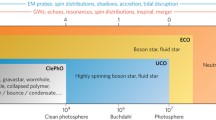Abstract
The new millennium will witness the operation of several long-baseline ground-based interferometric detectors, possibly a space-based detector too, which will make it possible to directly observe black holes by catching gravitational waves emitted by them during their formation or when they are perturbed or when a binary consisting of black holes in-spirals due to radiation reaction. Such observations will help us not only to test some of the fundamental predictions of Einstein's general relativity but will also give us the unique opportunity to map black hole spacetimes, to measure the masses and spins of black holes and their population, etc.
Similar content being viewed by others
References
Abramovici, A.et al. 1992,Science,256, 325.
Bender, P.et al. LISA:Pre-Phase A Report, MPQ 208 (Max-Planck-Institut für Quantenoptik, Garching, Germany). (Also see the Second Edition, July 1998).
Bender, R., Kormendy, J., Dehnen, W. 1996,Astrophys. J. Lett.,464, L123.
Blanchet, L., Iyer, B. R., Will, C. M., Wiseman, A. G. 1996,Class. Quantum. Gr.,13, 575.
Blanchet, L., 1996,Phys. Rev.,D54, 1417.
Blanchet, L., Sathyaprakash, B. S. 1995,Phys. Rev. Lett.,74, 1067.
Blanchet, L., Sathyaprakash, B. S. 1994,Class. Quant. Grav.,11, 2807.
Blanchet, L., Damour, T., Iyer, B. R., Will, C. M., Wiseman, A. G. 1995,Phys. Rev. Lett.,74, 3515.
Blanchet, L., Damour, T., Iyer, B. R. 1995,Phys. Rev.,D51, 5360.
Caron, B.et al. 1997,Class. Quantum Grav.,14, 1461.
Damour, T., Iyer, B. R., Sathyaprakash, B. S. 1998,Phys. Rev.,D57, 885.
Damour, T. 1983, inGravitational Radiation, (ed.) N. Deruelle and T. Piran, pp 59–144 (North-Holland, Amsterdam).
Damour, T. 1982,CR. Acad. Sci., Paris,294, (II) 1355.
Damour, T., Deruelle, N. 1981,Phys. Lett.,87A, 81.
Eckart, A., Genzel, R. 1996,Nature,383, 415.
Flanagan, é. é., Hughes, S. 1998,Phys. Rev. D,57, 4535.
Fukushige, T., Ebisuzaki, T., Makino, J. 1996,Astrophys. J.,396, L61.
Gaskell, C. M. 1996,Astrophys. J.,646, 107.
Haehnelt, M. G. 1994,Mon. Not. R. Astron. Soc.,269, 199.
Bender, P. L. 1995,Astrophys. J. Lett.,445, L7.
Kormendy, J., Richstone, D. 1995,Ann. Rev. Astron. & Astrophys.,33, 581.
Lipunov, V. M., Postnov, K. A., Prokhorov, M. E. 1997,Mon. Not. R. Astron. Soc.,288, 245.
Lück, H.et al., 1997,Class. Quantum Grav.,14, 1471.
Narayan, R., Piran, T., Shemi, A. 1991,Astrophys. J.,379, L17.
Peters, P. C., Mathews, J. 1963,Phys. Rev.,131, 435.
Phinney, E. S. 1991,Astrophys. J.,380, L17.
Press, W. H. 1971,Astrophys. J. Lett.,170, L105.
Rajagopal, M., Romani, R. W. 1995,Astrophys. J.,446, 543.
Rees, M. J. 1997,Class. Quantum Grav.,14, 1411.
Roos, N., Kastra, J. S., Hummel, C. A. 1993,Astrophys. J.,409, 130.
Sathyaprakash, B. S., Schutz, B. F. 1998, submitted to Living Reviews in Relativity.
Schutz, B. F. 1997, gr-qc/9710080, gr-qc/9710079.
Schutz, B. F. 1985,A First course in general relativity, (Cambridge Univ. Press, Cambridge.)
Schutz, B. F., 1986,Nature,323, 310.
Sigurdsson, S., Rees, M. J. 1996,Mon. Not. R. Astron. Soc.,284, 318.
SillanpÄÄ, A., Haarala, S., Valtonen, M. J., Sundelius, B., and Byrd, G. G. 1998,Astrophys. J.,325, 628.
Stairs, I. H.et al., 1997, astro-ph/9712296.
Taylor, J. H. 1994,Rev. Mod. Phys.,66, 711.
Thorne, K. S. 1995, inProceedings of Snowmass 1994 Summer Study on Particle and Nuclear Astrophysics and Cosmology, (eds) E. W. Kolb and R. D. Peccei, (World Scientific, Singapore) pp. 160–184.
Thorne, K. S., Braginsky, V. B. 1976,Astrophys. J.,204, L1.
Tsubono, K. 1995, inGravitational Wave Experiments (World Scientific, Singapore), p. 112.
Valtoja, L., Valtonen, M. J., Byrd, G. G. 1989,Astrophys. J.,343, 47.
Van den Heuvel, E. P. J., Lorimer, D. R. 1996,Mon. Not. R. Astron. Soc.,283, L67.
Van der Marel, R. P., de Zeeuw, T., Rix, H. W., Quinlan, G. D. 1996,Nature,385, 610.
Vecchio, A. 1997,Class. Quantum. Gr.,14, 1431.
Vishveshwara, C. V. 1970,Nature,227, 936.
Will, C. M. 1998,Phys. Rev. D,57, 2061.
Will, C. M., Wiseman, A. G., 1996,Phys. Rev.,D54, 4813.
Zwart, S. F. P., Spreeuw, H. N. 1996,Astron. Astrophys.,312, 670.
Author information
Authors and Affiliations
Rights and permissions
About this article
Cite this article
Sathyaprakash, B.S. Gravitational waves: The future of black hole physics. J Astrophys Astron 20, 211–220 (1999). https://doi.org/10.1007/BF02702353
Issue Date:
DOI: https://doi.org/10.1007/BF02702353




